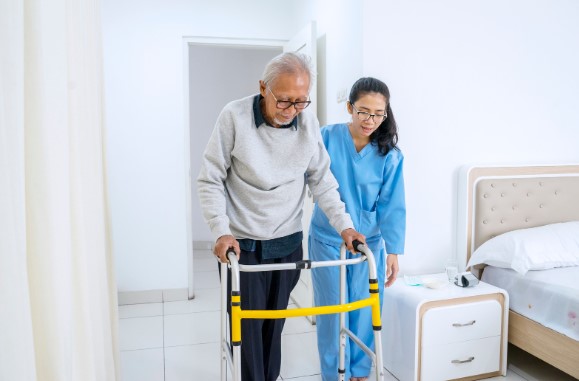 In the world of healthcare, there are unsung heroes who play a pivotal role in the well-being of patients. Certified Nursing Assistants (CNAs) are the compassionate souls who often work behind the scenes, providing invaluable support and care to those in need. In this article, we’ll explore the profound impact CNAs have on disabled patients, shedding light on the heartwarming stories of assistance, empowerment, and camaraderie.
In the world of healthcare, there are unsung heroes who play a pivotal role in the well-being of patients. Certified Nursing Assistants (CNAs) are the compassionate souls who often work behind the scenes, providing invaluable support and care to those in need. In this article, we’ll explore the profound impact CNAs have on disabled patients, shedding light on the heartwarming stories of assistance, empowerment, and camaraderie.
Understanding the Role of CNAs
Certified Nursing Assistants are the backbone of healthcare facilities, working tirelessly to assist patients with various daily activities and ensuring their comfort. They are trained professionals who bridge the gap between medical staff and patients, providing essential care that promotes physical and emotional well-being.
1. Personalized Care with Empathy
CNAs are not just healthcare providers; they are empathetic companions who understand the unique needs of disabled patients. They build connections that go beyond medical charts, offering emotional support and a listening ear.
- Assistance with Activities of Daily Living (ADLs): CNAs help disabled patients with tasks like bathing, dressing, grooming, and toileting, ensuring their dignity and comfort.
- Nutritional Support: They assist with feeding and ensure patients receive proper nutrition tailored to their dietary needs.
- Mobility and Transfers: CNAs help patients move safely, providing physical support and using specialized equipment if necessary.
2. Advocates for Patient Independence
One of the most remarkable aspects of a CNA’s role is its commitment to fostering patient independence. They empower disabled patients to regain a sense of control over their lives and encourage them to be as self-sufficient as possible.
- Personalized Exercise and Rehabilitation: CNAs work closely with patients to perform prescribed exercises and rehabilitation routines, helping them regain strength and mobility.
- Assistive Devices: They provide training and assistance in using mobility aids, such as wheelchairs, walkers, and crutches.
3. Creating a Supportive Environment
Disabled patients often experience feelings of vulnerability and isolation. CNAs step in not only as caregivers but also as companions who strive to create a warm and supportive atmosphere.
- Emotional Connection: CNAs build rapport with patients, engaging in friendly conversations, sharing stories, and providing a sense of companionship.
- Social Engagement: They help disabled patients participate in social activities within the healthcare facility, encouraging interaction and a sense of community.
4. Monitoring and Reporting
CNAs are trained to be vigilant observers of patients’ health and well-being. Their keen attention to detail allows them to notice subtle changes and promptly report them to the medical team.
- Vital Signs: CNAs regularly check and record vital signs such as heart rate, blood pressure, and temperature, ensuring any anomalies are addressed promptly.
- Communication: They serve as a vital link between patients and the medical staff, effectively relaying patient concerns and updates.
5. Providing Comfort and Assurance
Being in a healthcare setting can be overwhelming for disabled patients. CNAs go the extra mile to provide comfort and reassurance, creating a safe space where patients can feel at ease.
- Personalized Care Plans: CNAs follow care plans tailored to each patient’s needs, ensuring consistency in care and minimizing stress.
- Emotional Support: They offer a comforting presence during medical procedures, offering words of encouragement and holding a hand if needed.
6. Endless Dedication
CNAs are true heroes with hearts of gold. Their dedication goes beyond the clock, as they often form bonds with patients that last long after they’ve left the healthcare facility.
- Flexible Support: CNAs are available around the clock, providing continuous care and responding to patients’ needs at any hour.
- Patient Advocacy: They stand up for patients’ rights and ensure they receive the care they deserve, advocating for their needs.
Conclusion
Certified Nursing Assistants are the unsung heroes who bring light into the lives of disabled patients. Their compassion, dedication, and unwavering commitment to enhancing the quality of life for those in their care make a profound impact. As we acknowledge their remarkable contributions, let’s remember that CNAs are not just caregivers; they are the embodiment of kindness and support, making the healthcare journey a little brighter for everyone they touch. Wants to pursue a CNA career? Just visit cnatraininginstitute.org/about

